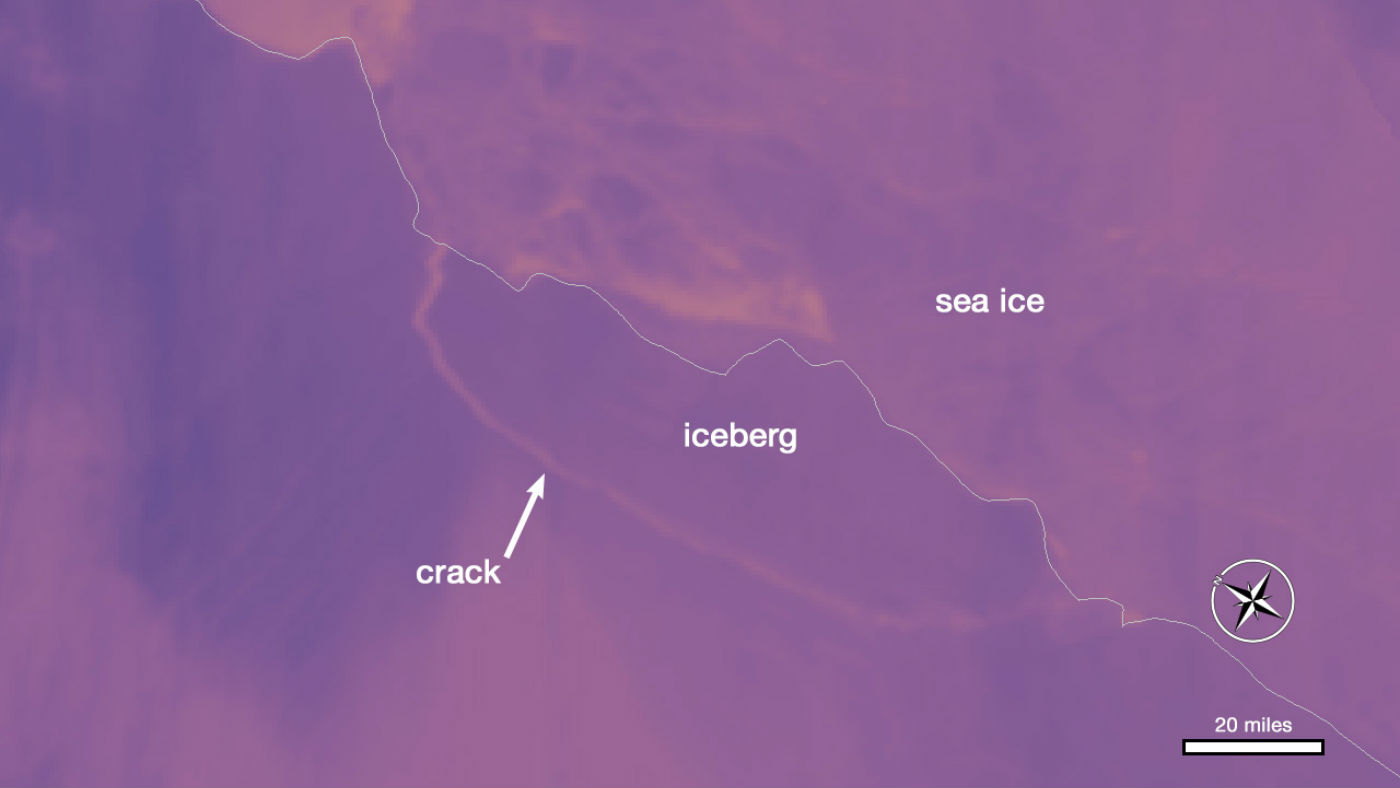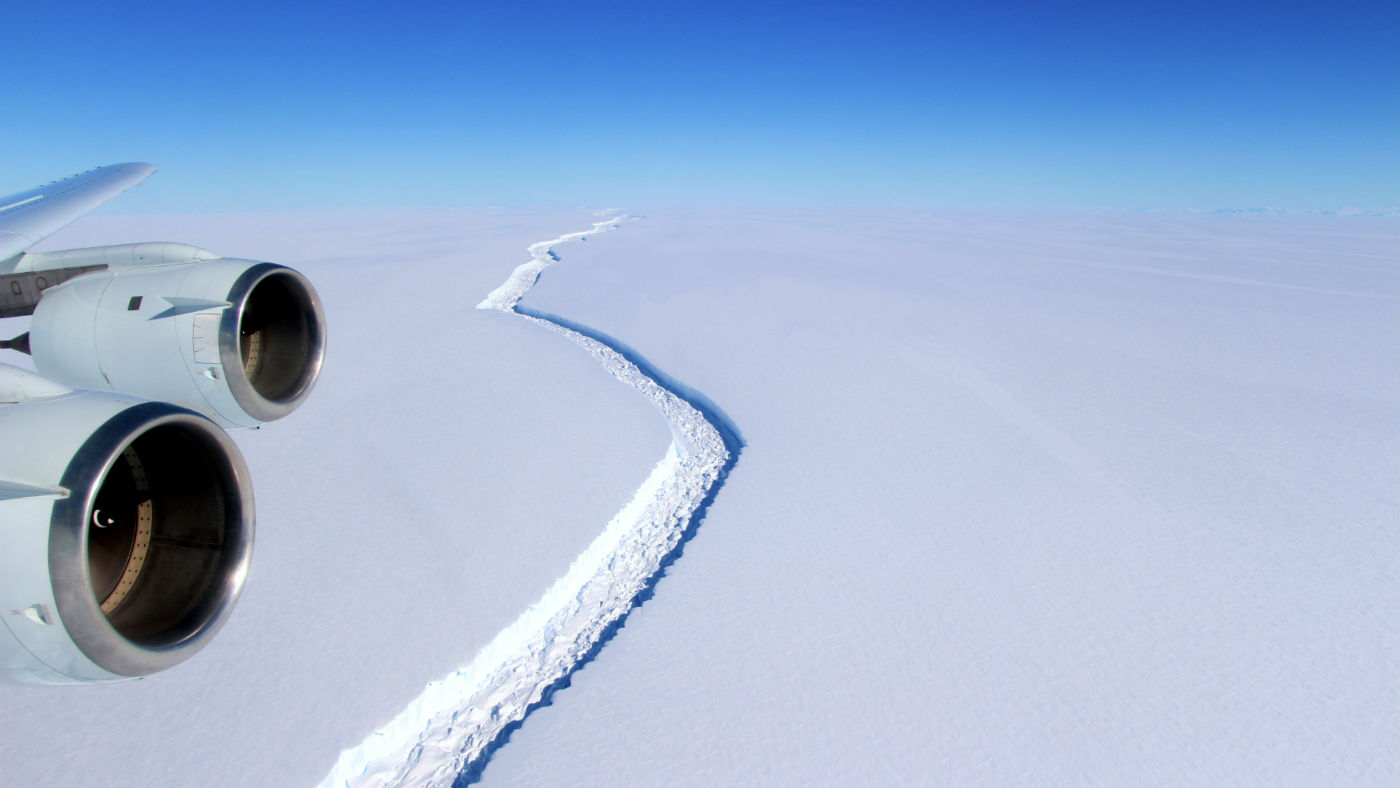Trillion ton iceberg breaks off Antarctica
Scientists disagree about whether climate change contributed to the split

A free daily email with the biggest news stories of the day – and the best features from TheWeek.com
You are now subscribed
Your newsletter sign-up was successful
An iceberg measuring twice the size of Luxembourg has broken away from Antarctica.
Scientists from the UK-based Project Midas had been monitoring the break in the Larsen C ice shelf - the fourth largest in Antarctica - following the collapse of the Larsen A ice shelf in 1995 and observed significant advances in the rift over the past 12 months.

The new iceberg, weighing more than a trillion tons, is now at the mercy of the ocean currents and could last for decades in the open seas, "creating an extra hazard for ships around the continent as it breaks up", says Reuters. It has an area of 2,239 sq miles (5,800 sq km).
The Week
Escape your echo chamber. Get the facts behind the news, plus analysis from multiple perspectives.

Sign up for The Week's Free Newsletters
From our morning news briefing to a weekly Good News Newsletter, get the best of The Week delivered directly to your inbox.
From our morning news briefing to a weekly Good News Newsletter, get the best of The Week delivered directly to your inbox.
Speaking to CNN, Professor Adrian Luckman of Swansea University, said that while the birth of the huge iceberg might look dramatic "the event does not directly affect anyone, and repercussions, if there are any, will not be felt for years".
"However, it is a spectacular and enormous geographical event which has changed the landscape," he said.

Attention has now turned to the cause of the split. Big icebergs break off Antarctica naturally, "meaning scientists are not linking the rift to manmade climate change", says Reuters.
But "while there is no evidence that the calving of the giant iceberg is linked to such processes", says The Guardian, Twila Moon, a glacier expert at the US National Ice and Snow Data Center, told the paper that climate change could have made the situation "more likely".
A free daily email with the biggest news stories of the day – and the best features from TheWeek.com

n area of 2,239 sq miles (5,800 sq km),
-
 The ‘ravenous’ demand for Cornish minerals
The ‘ravenous’ demand for Cornish mineralsUnder the Radar Growing need for critical minerals to power tech has intensified ‘appetite’ for lithium, which could be a ‘huge boon’ for local economy
-
 Why are election experts taking Trump’s midterm threats seriously?
Why are election experts taking Trump’s midterm threats seriously?IN THE SPOTLIGHT As the president muses about polling place deployments and a centralized electoral system aimed at one-party control, lawmakers are taking this administration at its word
-
 ‘Restaurateurs have become millionaires’
‘Restaurateurs have become millionaires’Instant Opinion Opinion, comment and editorials of the day
-
 Epstein files topple law CEO, roil UK government
Epstein files topple law CEO, roil UK governmentSpeed Read Peter Mandelson, Britain’s former ambassador to the US, is caught up in the scandal
-
 Iran and US prepare to meet after skirmishes
Iran and US prepare to meet after skirmishesSpeed Read The incident comes amid heightened tensions in the Middle East
-
 Israel retrieves final hostage’s body from Gaza
Israel retrieves final hostage’s body from GazaSpeed Read The 24-year-old police officer was killed during the initial Hamas attack
-
 China’s Xi targets top general in growing purge
China’s Xi targets top general in growing purgeSpeed Read Zhang Youxia is being investigated over ‘grave violations’ of the law
-
 Panama and Canada are negotiating over a crucial copper mine
Panama and Canada are negotiating over a crucial copper mineIn the Spotlight Panama is set to make a final decision on the mine this summer
-
 Why Greenland’s natural resources are nearly impossible to mine
Why Greenland’s natural resources are nearly impossible to mineThe Explainer The country’s natural landscape makes the task extremely difficult
-
 Iran cuts internet as protests escalate
Iran cuts internet as protests escalateSpeed Reada Government buildings across the country have been set on fire
-
 US nabs ‘shadow’ tanker claimed by Russia
US nabs ‘shadow’ tanker claimed by RussiaSpeed Read The ship was one of two vessels seized by the US military